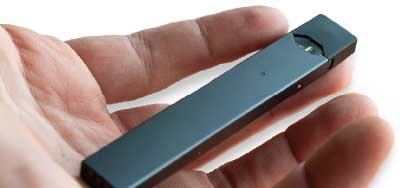E-Cigarette Use Rising Sharply
Abstract
While the FDA was focused on youth use of combustible cigarettes, another tobacco product has caught on like wildfire among adolescents: e-cigarettes.

The FDA delayed implementation last year of an Obama-era law that would have more tightly regulated e-cigarettes and banned flavoring. These products are now sold in youth-enticing flavors, such as creme brulee, cotton candy, gummi bear, and “unicorn milk” and are easy for teens to buy online. The FDA is now reconsidering its decision.
To try to address this epidemic, the FDA launched a multimedia campaign last month to educate youth about the dangers of e-cigarettes, “The Real Cost Youth E-Cigarette Prevention Campaign.” In addition, the FDA issued warning letters and fined 1,300 retailers who illegally sold the products to minors. The FDA also requested manufacturers to provide plans on how to curtail use of their products by minors.
Fueling the epidemic among adolescents is a specific type of e-cigarette known as “pod mods,” particularly the Juul brand, according to an article last month in the New England Journal of Medicine (NEJM).
The authors of the NEJM study, Jessica L. Barrington-Trimis, Ph.D., and Adam M. Leventhal, Ph.D., pointed out that just one of the Juul-brand pod mods delivers as much nicotine as an entire pack of cigarettes, and they come in appealing flavors like mango, creme brulee, and fruit medley.
The slim devices, which closely resemble a portable charger or memory stick, are rechargeable and easy to conceal. Fun “skins” are available to personalize them. Because pod mods are so easy to use and don’t produce smoke, kids can use them without the awareness of teachers, parents, and other adults with whom they interact. The majority of 15- to 24-year-olds surveyed (63 percent) did not know that nicotine is present in all Juul products, the authors wrote.
“Nicotine adversely affects the developing brain and causes addiction,” the authors noted. “Adolescent exposure to nicotine is associated with an increased risk of mood and attention problems. Given the high nicotine concentrations in pod mods, the nicotine-related health consequences of use by young people could be worse than those from most e-cigarette products.”
Pod mods have few of the deterrents of combustible cigarettes, such as the noxious taste and sensations of the initial smoking experience, which may explain why 80 percent of 15- to 24-year-olds who try Juul continue to use the product. Because of the high nicotine content, pod mods may also increase the risk of switching to combustible cigarette smoking.
“Comprehensive actions are urgently needed to counteract adolescents’ use of pod mods and other e-cigarettes. In the meantime, we advise physicians and parents to remain on alert regarding this emerging public health concern,” the authors concluded. ■
“Adolescents’ Use of ‘Pod Mod’ E-Cigarettes—Urgent Concerns” can be accessed here. The FDA’s statement on the steps it has taken to address the epidemic of youth use of e-cigarettes is available here.
See related article: FDA’s ‘Real Cost’ Campaign Cuts Cigarette Smoking by Teens.



